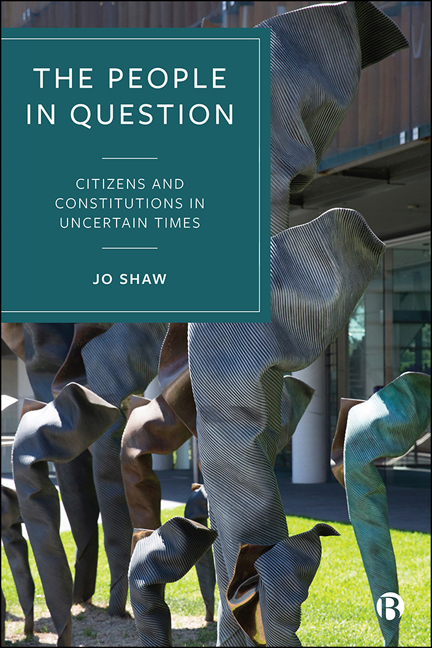8 - Conclusions
Published online by Cambridge University Press: 18 March 2021
Summary
I embarked on the task of exploring The People in Question by embracing a widely shared intuition, namely that constitutions and citizenship are closely related in modern states. I then took it into an intellectual space that seemed to be surprisingly sparsely occupied. Hitherto, there have been few in-depth attempts to make sense of the interactions between citizenship and constitutions, or to place those interactions in a wider context. This was a puzzle, which demanded an answer. A second puzzle also formed part of my motivations. Why is it that citizenship is so rarely regulated, in substantive terms, within constitutions themselves? Why is it, as we have seen throughout Part II, that the constitutional substance of citizenship so often reveals itself in ways that are indirect or that present a fragmented picture, so that the pieces need to be assembled from different sources in order construct an intelligible picture? Is citizenship really such a taken-for-granted element of the typical constitutional set-up that it is sufficient for constitution-makers just to refer to it glancingly in the text of the constitution, delegating the task of settling the detailed terms of membership to the various majoritarian or non-majoritarian institutions of the state? And if the latter, how do we choose who should decide? If the task is one of fixing the people, then who but ‘the people’ can complete the task? The problem seems circular in nature.
This unresolved dilemma reinforces one insight that has emerged from pursuing these puzzles about citizenship and constitutions. There is no such thing as a purely descriptive approach to examining the interactions of citizenship and constitutions. This is what I intended to imply by choosing the book title of The People in Question. Even if we treat state membership largely as an artefact of government, the task of describing citizenship and constitutions in the same space remains an exercise in understanding and interpreting those interactions in the context of the claims of citizenship and of constitutionalism as idealized practices. Such a task involves ethical choices, which inevitably have distributional, social and political effects.
It has not been my primary intention at any point to impose my own view about what citizenship ought to encompass and how it should be dealt with by constitutions, about who ought to belong and who ought not, or about who should determine the answers to questions such as these.
- Type
- Chapter
- Information
- The People in QuestionCitizens and Constitutions in Uncertain Times, pp. 253 - 258Publisher: Bristol University PressPrint publication year: 2020



